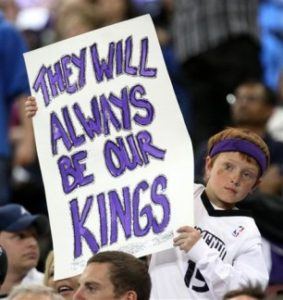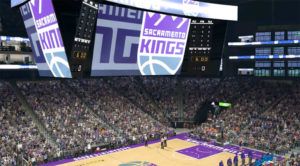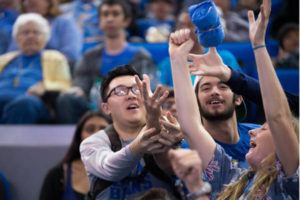The Kings’ Way: How the Sacramento Kings have Gone Digital

Sports are a tradition as old as human kind. What started out as games played primarily for entertainment and leisure has evolved into one of the most powerful industries in the world. From the sponsorship of teams and players, to the plethora of merchandise, to the actual consumption of the sport, the business of sports touches almost every American to some extent. It’s safe to say that as technology continues to progress, the sports industry will only become more ubiquitous. An example of a sports franchise that has differentiated itself by creating and capturing value through digital transformation is the NBA’s Sacramento Kings.
 The Sports Industry Success Equation
The Sports Industry Success Equation
Sacramento Kings owner, Vivek Ranadive, stated earlier this year “What’s the difference between a customer and a fan? Fans will paint their face purple, fans will evangelize. Every other CEO in every business is dying to be in our position – they’re dying to have fans.”[1]
One of the biggest advantages that sports teams have, is that their consumers are fans.
Fans are loyal.
Loyalty leads to conversion.
Thus, the more fans a sports team has, the more money that will be generated for the team.
Because of this relationship, teams are constantly looking for ways to innovate, not only in order to build a winning team, but also in order to gain more fans, and ultimately capitalize on the loyalty of those fans. The Sacramento Kings has successfully done this through technology in two major ways.
Unprecedented Fan Experience
First, the Kings have completely changed the way that their fans experience basketball games. The Sacramento Kings’ high tech stadium, Golden1 Arena, which opened  earlier this year, is the most technologically advanced stadium ever built[2], and was explicitly built to service its fans. The arena is connected to the Sacramento Kings app. From the time a fan steps into the arena, his/her phone becomes a remote control for the whole arena. Everything from finding his seat, to ordering food and drinks, to controlling the temperature at his seat, can be done through the app. The 17,000 fans in the arena are able to access the app through the arena’s wifi, managed by the arena’s 6,000 square foot data center, and enormous DAS (distributed antenna system) – which also makes it the most connected arena in the world. Having the ability to watch on-demand instant replays, check live stats, and watch virtual reality replays are all perks of being a Sacramento Kings fan in 2016. [3]
earlier this year, is the most technologically advanced stadium ever built[2], and was explicitly built to service its fans. The arena is connected to the Sacramento Kings app. From the time a fan steps into the arena, his/her phone becomes a remote control for the whole arena. Everything from finding his seat, to ordering food and drinks, to controlling the temperature at his seat, can be done through the app. The 17,000 fans in the arena are able to access the app through the arena’s wifi, managed by the arena’s 6,000 square foot data center, and enormous DAS (distributed antenna system) – which also makes it the most connected arena in the world. Having the ability to watch on-demand instant replays, check live stats, and watch virtual reality replays are all perks of being a Sacramento Kings fan in 2016. [3]
Capturing and Engaging Fans
While the arena is a great experience for Kings fans during the game, the Kings have also made it a priority to ensure that fans have access to the team outside of the arena. Ranadive stated “(The team) is much bigger than a sports team; it’s a social network.”[4]
 In the digital era, consumers can be connected to their product of choice 24 hours a day, 7 days a week, wherever they please. Sports fans are no different. They want to be connected to their sports teams and players at any given moment. The Kings have achieved this by taking advantage of technology in a way that most sports teams have yet to discover. Take, for example, the T-Shirt toss – a tradition of NBA games in which a mascot throws team t-shirts into the crowd of fans and 15-20 lucky fans walk away from the game with free team merchandise. Regardless of the trajectory of the game, fans can rely on this happening, and thus, is one of the most anticipated parts of any NBA game. The Kings have brought this experience to its fans who are not able to make it to live games. During games, fans can participate in a virtual t-shirt toss through the Kings’ app and are randomly selected to win t-shirts. Additionally, through Google+ hangout sessions, fans are able to connect with the team and players during and post games.
In the digital era, consumers can be connected to their product of choice 24 hours a day, 7 days a week, wherever they please. Sports fans are no different. They want to be connected to their sports teams and players at any given moment. The Kings have achieved this by taking advantage of technology in a way that most sports teams have yet to discover. Take, for example, the T-Shirt toss – a tradition of NBA games in which a mascot throws team t-shirts into the crowd of fans and 15-20 lucky fans walk away from the game with free team merchandise. Regardless of the trajectory of the game, fans can rely on this happening, and thus, is one of the most anticipated parts of any NBA game. The Kings have brought this experience to its fans who are not able to make it to live games. During games, fans can participate in a virtual t-shirt toss through the Kings’ app and are randomly selected to win t-shirts. Additionally, through Google+ hangout sessions, fans are able to connect with the team and players during and post games.
The Future of Sports
Exactly three years since Kings owner, Vivek Randeve, took over the team, revenues have doubled – even though the team’s on-court results have not been notable by any definition. The booming business can be attributed to Vivek’s digital transformation of the organization. His Silicon Valley tech background written all over the franchise transformation, forces me to question the future of the sports industry. For an uninspiring team to have $507 million spent on digital transformation instead of talent and performance improvement technology, makes me think that the game is getting lost in the noise of digital. Will fans be more influenced and willing to convert as a purchasing consumer based on their digital experience, or will the talent and success of the team continue to be the main driver of conversion? [840]
[1] Loren Mooney, Five Key Trends That are Driving the Business of Sports, INSIGHTS by Stanford Business, 28 Apr. 2014,
https://www.gsb.stanford.edu/insights/five-key-trends-are-driving-business-sports
[2] David Pierce, The Highest-Tech Stadium in Sports is Pretty Much a Giant Tesla, WIRED, 3 Jun. 2016,
https://www.wired.com/2016/06/highest-tech-stadium-sports-built-like-tesla/
[3] Cory Johnson, The Sacramento Kings’ New High-Tech Stadium, Bloomberg, 27 Sep. 2016,
http://www.bloomberg.com/news/videos/2016-09-27/the-sacramento-kings-new-high-tech-stadium
[4] Loren Mooney, Five Key Trends That are Driving the Business of Sports, INSIGHS by Stanford Business, 28 Apr. 2014,
https://www.gsb.stanford.edu/insights/five-key-trends-are-driving-business-sports



The last few sentences in your post reflected my exact sentiment on the matter – what good is a fancy stadium without a good team? I draw a lot of parallels with the Dallas Cowboys and their monster stadium in Arlington. While technologically incredibly advanced, with at the time the largest television screen in the world, it was more of a shining example of the team’s ineffectiveness in recent years as Dallas piled up L’s in a shiny building. As of writing, the Kings are 12th in an already tough Western Conference – in which case, is the technology merely used to distract disappointed fans? Is it an investment for when the team becomes a strong competitor? Or could the resources have been utilized elsewhere?
I’ll echo Andrew’s questions and add one of my own: does the Kings’ incredibly robust use of technology and connectivity in the fan experience translate at all to their approach to on-court analytics and analysis? There are pretty amazing technologies, in use by most NBA teams at this point, that allow players, coaches and the front office to track individual dribbles, player angles, distances, etc. in order to more effectively allocate and value talent, as well as scout competitors. With such a deep investment in the technology for the fans, you’d imagine that there would be a matching focus on the competitive side, but (as both you and Andrew mentioned), there has been no discernible improvement in on-court performance during this time. I’ll be watching closely to see if the on-court product catches up to the fan experience any time soon.
Awesome post – I was surprised to hear about all of the innovation happening in the sports industry! While this was exciting and interesting, I shared the exact same concerns as you, ahuynh and TB12 – this is a massive investment in digital transformation, but was this the right investment for the team? First, I feel that these digital innovations are only going to make current fans even more loyal, as opposed to acquiring new fans. While this is great, it isn’t going to generate much incremental revenue. Second, if the team’s track record doesn’t improve, these digital innovations are meaningless, since fans won’t be as engaged and excited about following the team and coming to the venue anyways. I wish they would have focused first on team improvement investments before spending $507 million on these innovations.
Such an interesting post! I definitely agree with your sentiment about the team’s performance and echo the comments of our classmates above. I am curious what they plan on doing with all of this customer data that they are acquiring. Do you think they will ever be in the business of selling this data to some of their sponsor and advertising partners? I could see the Kings becoming a data driven company partnering with car and beer companies to help them better target consumers if the team performance continues to be low.